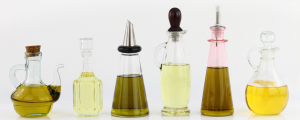Fossil fuels are made from decomposing plants and animals. Biodiesel is the best alternative to fossil fuels. Biodiesel can be used instead of diesel in the existing machinery. It is different from biofuels. Biofuels are fuels derived from sources that have biological origins. Biodiesel, on the other hand, is a complete replacement for diesel in existing engines and machinery. It is free from any toxicity. Biodiesel is majorly produced by two main groups of raw materials that can be categorized as vegetable oil and waste cooking oil. Many other raw materials are also used to produce biodiesel.
Different Types of Oil and Oil Seeds:
Vegetable Oil
Producing biodiesel from vegetable oil is one of the most conventionally used methods. Raw or refined plant oil, or recycled greases are processed to generate biodiesel which can then be used as vehicle fuel. The heated vegetable or animal oils are blended along with petrol-diesel within the ratio of 10–40%.
Sunflower oil
In Europe, biodiesel is mainly obtained from the oilseeds like sunflower and rapeseed. Sunflower oil needs to be waxed and refined before blending with diesel to generate biodiesel. It is also a little pricier than soybean oil. But it gives more oil per acre than soybean. Hence it is popularly known as a high content seed.
Rapeseed oil
Edible rapeseed oil is another very commonly used resource for biodiesel production in Europe. Rapeseed oil has a low cloud point which makes it gel at a low temperature. Due to this typical characteristic, biodiesel made from rapeseed oil is particularly suitable for places with low temperatures.
Palm oil
Biodiesel is derived from palm oil, which is then used in diesel engines. The advantage of palm oil is that it can be used in engines without any modifications being done to it. The element that is extracted from palm oil is called methyl esters. The extraction is done by a process called transesterification. In the Philippines, coconut is used to produce biodiesel and Palm is the primary raw material for producing biodiesel. Interestingly, when producing biodiesel from coconut oil, the resulting product, that is, the biodiesel’s mass is greater than the mass of the coconut oil.
Soybean
Currently, soybean is one of the significant contributors to the production of biodiesel. Soybean generates 41% less quantity of greenhouse gas emissions than petroleum. In the USA and South America, especially in Brazil and Argentina, biodiesel is obtained mainly from the soybean.
Used cooking oil serves multiple purposes. If used constructively, it helps in preserving the environment and also enables the production of alternate fuels. Else, it is often discarded in the drainage system or sold to manufacturers who in turn use it to prepare adulterated food items. Biodiesel extracted from used cooking oil is of premium quality. It can be used for flying an aircraft as well as for driving a sedan. Around 850 ml of biodiesel can be produced from 1 liter of used cooking oil. With advanced technology, one can also convert 1 liter of UCO to one liter of biodiesel.
Animal fats
Animal fats help generate biodiesel. This type of biodiesel is prepared from the waste fats of animals like buffalo and beef tallow. Waste fats are converted into oil by using a rendering methodology, although this source has its limitations due to the finite availability of raw material.
Algae
Biodiesel is also produced by using algae oil derived from algae. The production price of microorganism oil depends on many factors, some of which are the yield of biomass from the culture system, the oil content, the dimensions of production systems, and the worth of convalescent oil from microorganism biomass. The major limitation of this method is that the process of algae cultivation demands a large volume of water.
Biodiesel is the best alternative to fossil fuels. It involves simple production methods and the raw materials needed are readily available. Biodiesel is cheaper when compared to other fuels and is affordable for all. It is eco-friendly as the automobiles that run on biodiesel cause less pollution as compared to the other fuels. The biodiesel preparation process is also environmentally friendly and no toxic wastes are released during the preparation phase.
Of all the available raw materials – used cooking oil remains the best option, especially in a country like India, where every Indian, on average, consumes, 19.5 kgs of edible oil each year! If we are able to collect used cooking oil from every Indian household and from all the commercial eateries – we can certainly create a greener and healthier India.




